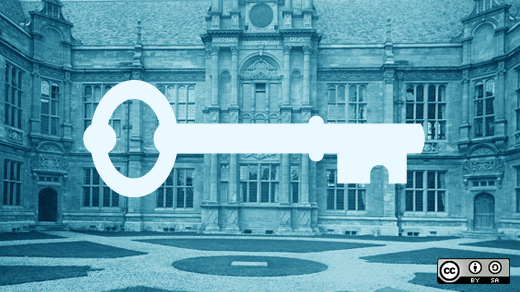For those who haven't heard, the Obama administration recently announced $2 billion in funding for 2-year colleges, much of which will be used to produce open educational resources. The details are complicated and still being hashed out in discussions all over the internet, but it's clearly the largest single investment in OER since, well, ever. It's an event of seismic proportions in the world of open education. With silver linings, though, come clouds -- and the SCORM cloud looks like it could be a big one.
Last Thursday, the Department of Labor announced a big grant program with a big name: the Trade Adjustment Assistance Community College and Career Training Grants Program, or TAACCCT for "short". A large part of the grant's goal is to create great learning materials for career training -- with the stipulation that all materials created with these grants will be licensed as CC-BY.
The choice of license requirement has enormous implications, which will doubtless by examined and re-examined over the coming months. The excitement in the open education world about the licensing requirement has, however, been somewhat tempered by the imposition of SCORM as a technical requirement.
SCORM is an acronym for "Sharable Content Object Reference Model", originally devised to be used by the United States Department of Defense to package eLearning content for military use. Over time, it has become the de facto standard for sharing eLearning content across various Learning Management Systems -- but the broad and somewhat open-ended nature of the standard (the most recent Documentation Suite is hundreds of pages long) allows wide variation among SCORM implementations. Some of those implementations aren't very good, and even with the best tools, writing SCORM-compliant eLearning modules can be a challenge. Which makes SCORM an inviting target for debate.
The most pointed criticism comes from Rob Abel, the CEO of IMS. IMS has a set of standards that compete with SCORM, so Abel's take on the SCORM requirement is predictable and colorful. Here's a representative excerpt from Abel's note to the IMS community on January 23th:
As a minimum it seems that the Department of Labor and the Department of Education should be allowing industry and institutions to choose from among a list of open standards on TAACCCT, rather than dictating the use of something that has already been shown not to work. The bottomline is that the higher education segment can decide for itself what open standards it should use to build a base of OER content!!! Maybe they'll choose IMS, maybe they'll choose SCORM, or perhaps they will choose to use something else. But we don't need the government regulating this. Does government regulate what Internet standards we use?
Abel then goes on to list seven technical reasons why, in his opinion, SCORM is a poor choice. One of those key points: SCORM is, for most classes of users, a "write-only" standard. It's a great platform for delivering eLearning content, one-on-one, because that's what it was designed to do. SCORM was not designed to allow content to be remixed extensively, as many of its adherents will attest -- which certainly makes it a curious requirement for Open Educational Resources, much of the value of which is predicated precisely on the idea of remixability.
Note also that TAACCCT requires content compliance with SCORM 2004, the latest version of the SCORM standard. Most of the LMS solutions in the wild don't yet fully support SCORM 2004, including Moodle and Sakai, the two largest open source LMS platforms. The practical effect of this mandate, then, at least in the near term, will be to restrict would-be grantees to the subset of content producers who can afford to hire knowledgeable SCORM developers to package their content, or who can pay licensing fees for best-of-breed tools. Rustici Software, a leading SCORM vendor and owner of the scorm.com domain, acknowledges the costs of making content SCORM-compliant:
Achieving basic SCORM conformance for your content can often be accomplished by a talented software developer in a reasonable time frame. The hard part is creating content that is not only conformant, but also broadly compatible. Many LMS implementations have slightly different interpretations of the specifications and other quirks that can make seamless interoperability a challenge.
So according to the leading vendor in the space, one talented software developer buys you basic compliance and poor interoperability. Of course, Rustici has a solution they’ll be happy to sell you.
Michael Feldstein, who heads product strategy for Academic Enterprise Solutions at Oracle and certainly knows a thing or two about the LMS world, strikes a more conciliatory tone than Abel does, but comes to a similar conclusion:
I understand why the Federal government wants to mandate a particular standard for content reuse, but I think it’s a mistake in this case. Educational content re-use is highly context-dependent, which means that no one standard is going to support all or even most of the relevant use cases. There will be times when SCORM is the best, times when IMS Common Cartridge is the best, times when RSS/Atom is the best, and times when just plain old HTML is really all that you need. Imposing a SCORM requirement for all resources will substantially increase the labor involved in producing them without necessarily bringing a payoff. The likely result will be fewer grantees will produce OERs and fewer of the OERs produced will be re-used.
So what will this SCORM mandate mean? We don't know yet.
One possible solution might be to earmark some of that $2 billion in grant money for improving SCORM integration with open source projects like Moodle or Sakai, or even for Drupal. There’s nothing wrong with SCORM vendors making money, of course, but it seems like a good idea to invest in open tools to build open content. It's not yet clear whether anyone will pursue grants for this purpose, and if they do, whether the grantors will consider this to be a good way to spend their money.
One might also wonder whether the Department of Labor understood the full impact of this choice, and whether or not the choice is irrevocable. Even Tim Martin of Rustici assents that Abel "...would be justified in complaining about the exclusion of IMS CC as a potential approach to reuse as part of the grant program." Is it too late for the Department of Labor to change this requirement? It's unclear.
What is clear: securing funding at this level is a momentous achievement for the world of open education. It's laudable that the Obama administration should be so committed to open standards, both for software and for content. Let's hope that strict adherence to a particular standard doesn't undermine the value of using open standards in the first place.







3 Comments